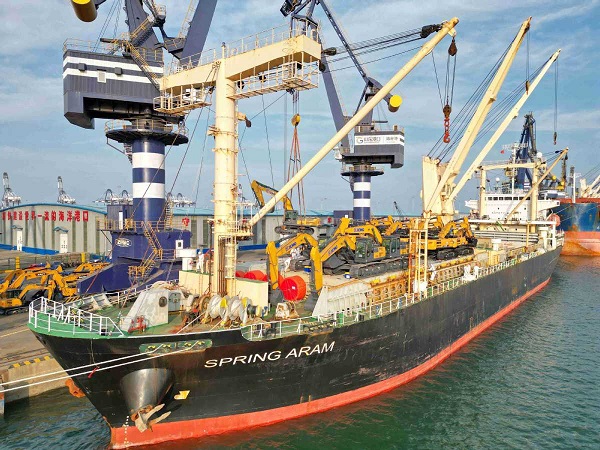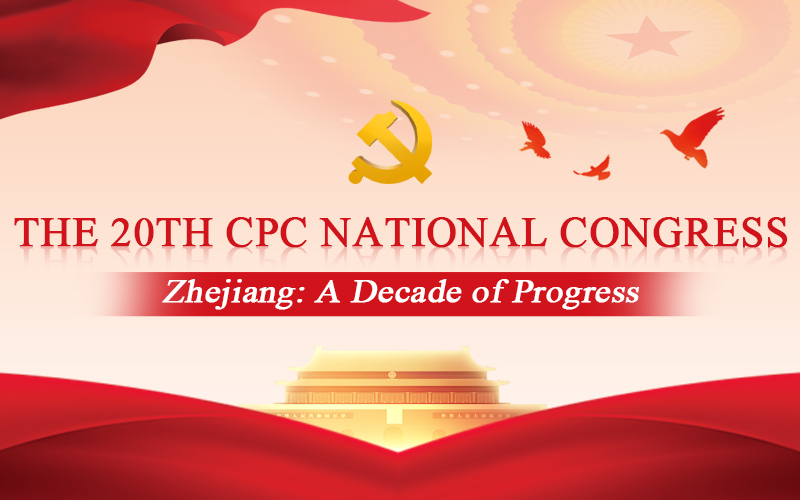Chinese exporters see win-win deals as RCEP takes effect in Indonesia

Engineering machinery is loaded at Yantai Port, Shandong province, for export to Indonesia. TANG KE/FOR CHINA DAILY
The Regional Comprehensive Economic Partnership, or RCEP, agreement took effect in Indonesia on Monday, further deepening regional cooperation between China and ASEAN countries.
Indonesia's new regulations have specified the procedure of obtaining certificates of origin for goods exported from the Southeast Asian country, as part of implementing the RCEP agreement, said Indonesian Trade Minister Zulkifli Hasan.
The RCEP comprises 10 member states of ASEAN plus China, Japan, South Korea, Australia and New Zealand. In 13 of the 15 member economies, the RCEP agreement had taken effect at different points in time last year. With Indonesia joining them now, only the Philippines remains where the agreement is yet to be ratified and implemented.
Over the past year, the RCEP has helped lower tariffs, facilitated integration of industrial chains and benefited consumers in the 14 markets.
"The implementation of the China-ASEAN Free Trade Agreement in the past meant that the tariff rate on our exports of bicycle accessories to Indonesia was 5 percent. Now, thanks to the RCEP, the tariff rate has been further reduced to zero, which greatly reinforces the competitiveness of our products," said Huang Xinzhen, manager of Yiwu Zhihong Import and Export Co in East China's Zhejiang province.
The company, which mainly exports daily necessities and machine parts to Southeast Asia, received Zhejiang's first certificate of origin, which helped it to export to Indonesia under the RCEP.
With such certificates, Zhihong can now enjoy preferential tariffs on its exports to RCEP member countries.
Jiaxing Xin'an Packing Materials Co, another foreign trade firm in Zhejiang, is one of the prominent heat-shrinkable film producers based in Jiaxing city. The RCEP has boosted the firm's competitiveness and expanded its reach in overseas markets and global production networks, said Yang Liteng, its general manager.
"The basic tax rate on PVC heat-shrinkable film exports to Indonesia was 10 percent, and the preferential tax rate under the China-ASEAN Free Trade Agreement was 5 percent. But now, the import tariff has been reduced to zero," said Yang.
He said the introduction of the zero tariff under the RCEP is expected to reduce or exempt tariffs worth about 370,000 yuan ($53,710) per year based on 2022 data.
Meanwhile, Hangzhou Customs has reportedly developed a smart service platform to help companies in Zhejiang to plan their taxes so as to make full use of tax reductions, expand their international footprint and enhance their competitiveness.
In Qingdao, Shandong province, local Customs issued the province's first RCEP- and Indonesia-related certificate of origin to Qingdao SanMu Aquatic Products Co Ltd, which exported a batch of frozen salmon fillets.
With the certificate, the exports can enjoy the zero-tariff policy, said Sun Zhijun, the company's general manager, adding the previous tax rate was 10 percent.
According to Sun's calculations, the new policy could help his company save more than 100,000 yuan by way of tariff cuts when the exported goods arrive in Indonesia and go through local Customs clearance.
"Every year, our company exports more than 20 million yuan worth of frozen salmon fillets to Indonesia and it is expected to save over 2 million yuan by way of tariff cuts the whole year," said Sun.
It is a big tariff concession for the fishery business as it does not make considerable profits. It will be beneficial for the business to land more business orders from other RCEP markets and accelerate exports, said Sun.
ASEAN is the largest trade market for Shandong province. Indonesia is the biggest ASEAN country to accord Shandong favorable export tariffs. From January to November 2022, Shandong exported 39 billion yuan worth of goods to Indonesia, up more than 29 percent year-on-year.
In the same period, Qingdao Customs issued Free Trade Area-related certificates of origin to some 240,000 batches of Indonesia-bound goods entailing tariff cuts or exemptions worth 13.6 billion yuan.
Bi Haijun, an official with Qingdao Customs, said aquatic products and non-slip mats can enjoy more favorable tariffs with the RCEP agreement taking effect in Indonesia.
"Since July last year, clients in Japan and Southeast Asia have been more willing to choose us for cooperation, for they know that the RCEP tariff reduction will bring more benefits," said Li Yonghong, deputy CEO of a Guangdong-based medical technology company. So far, the company has applied for 72 certificates of origin under the RCEP, involving goods worth 7 million yuan.
From January to November 2022, Guangzhou Customs issued 14,021 preferential export certificates of origin under the RCEP, which led to tariff cuts or exemptions worth 4.75 billion yuan.
Customs data for the period showed China's imports and exports with the other 14 RCEP members were worth 11.79 trillion yuan, up 7.9 percent year-on-year.
Fang Xiaoying in Hangzhou contributed to this story.


 Shaoxing Showdowns
Shaoxing Showdowns Zhejiang: A Decade of Progress
Zhejiang: A Decade of Progress Shaoxing in expats' eyes
Shaoxing in expats' eyes